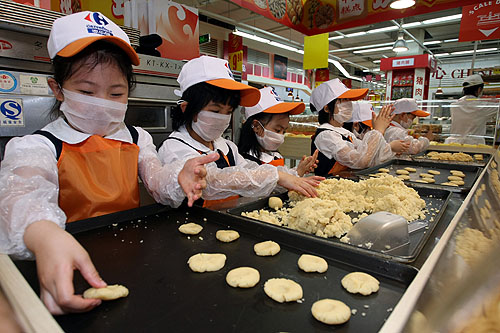|
 |
|
SWEET SPOT: Children from Jiangsu Province's Wuxi City learn to make cookies in a super market on June 1, 2009. They spent a special Children's Day learning about food safety (HUAN WEI) |
The State Council, China's cabinet, promulgated the Regulation on the Implementation of the Food Safety Law on July 8.
The regulation, which went into effect on July 20, details the requirements for food manufacturers and wholesalers in food processing and distribution. It also highlights the importance of health authority supervision in the Food Safety Law.
Food safety defined
The Food Safety Law was approved on February 28 at the Seventh Session of the Standing Committee of the 11th National People's Congress and took effect on June 1.
The Legislative Affairs Office of the State Council (LAOSC), with the Ministry of Health (MOH), created a draft version of the regulation in January to coordinate the implementation of the Food Safety Law, said an official with the LAOSC.
From January to April, the LAOSC solicited opinions from other departments and local governments four times and held coordination meetings five times, said the official. The office also sought opinions from enterprises and industrial associations, he said.
The LAOSC released the draft to the public from April 24 to May 4 and received nearly 10,000 comments.
The LAOSC worked out the final version of the regulation after considering opinions from interested parties and meeting the objectives of food safety supervision, the official said.
The regulation, he said, is important for three reasons.
First, it makes clear the requirements for food enterprises as the primary responsible organizations. "The regulation put its emphasis on pre-emptive prevention, processing and distribution control and the retrospective mechanism for food safety accidents," the official said.
Second, the regulation strengthens the mandates of different food safety supervisory departments and clarifies their responsibilities to coordinate and connect with each other.
Third, the regulation is designed to complement and improve the workings of the Food Safety Law.
Responsibilities of enterprises
The regulation makes concrete rules as to the responsibilities of food producers and sellers as the primary responsible parties.
"Production is a weak link in food safety," said the official. "To guarantee food safety, producers must carefully control the whole process of food production."
The regulation stipulates that food producers should set up and carry out a raw materials acceptance system as well as processing safety management. They must also provide acceptable controls on raw materials, key production links, inspection and transportation and delivery.
The food producers must accurately record the safety management information on food-processing procedures and keep the record for at least two years, said the official. "If accidents occur during processing that do not conform to management requirements, the producers should take actions to identify the causes and make immediate improvements."
The regulation also urges food wholesalers to set up sales record-keeping systems to guarantee that condemned foods are traceable.
Besides the parts of the Food Safety Law that give food producers and wholesalers the right to request certificates and bills when stocking food, the regulation adds stipulations that food wholesalers should record names and contacts of suppliers, or keep sales bills for at least two years that contain the information.
The regulation also clarifies safety management. "Food and beverage service can directly impact consumers' health and lives," said the official. The regulation requires food and beverage providers to establish standard methods for purchasing raw materials to guarantee they are in accordance with food safety standards.
The regulation also requires that food and beverage providers clean and maintain their processing and refrigerating equipment on a regular basis.
Government supervision
The regulation makes clear the responsibilities of local governments and food safety supervision departments.
Local governments are to shoulder the burden of responsibility in local food safety supervision. Local governments at or above the county level are to set up a mechanism for coordination between different authorities and improve the flow of information regarding food safety and food inspection technology.
| 